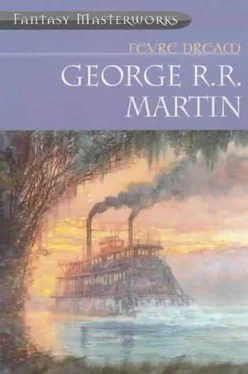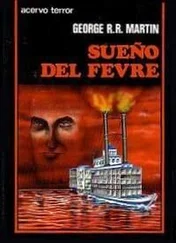George Martin - Fevre Dream
Здесь есть возможность читать онлайн «George Martin - Fevre Dream» весь текст электронной книги совершенно бесплатно (целиком полную версию без сокращений). В некоторых случаях можно слушать аудио, скачать через торрент в формате fb2 и присутствует краткое содержание. Жанр: Фэнтези, на английском языке. Описание произведения, (предисловие) а так же отзывы посетителей доступны на портале библиотеки ЛибКат.
- Название:Fevre Dream
- Автор:
- Жанр:
- Год:неизвестен
- ISBN:нет данных
- Рейтинг книги:4 / 5. Голосов: 1
-
Избранное:Добавить в избранное
- Отзывы:
-
Ваша оценка:
- 80
- 1
- 2
- 3
- 4
- 5
Fevre Dream: краткое содержание, описание и аннотация
Предлагаем к чтению аннотацию, описание, краткое содержание или предисловие (зависит от того, что написал сам автор книги «Fevre Dream»). Если вы не нашли необходимую информацию о книге — напишите в комментариях, мы постараемся отыскать её.
Fevre Dream — читать онлайн бесплатно полную книгу (весь текст) целиком
Ниже представлен текст книги, разбитый по страницам. Система сохранения места последней прочитанной страницы, позволяет с удобством читать онлайн бесплатно книгу «Fevre Dream», без необходимости каждый раз заново искать на чём Вы остановились. Поставьте закладку, и сможете в любой момент перейти на страницу, на которой закончили чтение.
Интервал:
Закладка:
York smiled and passed it to him.
“Cap’n, tonight’d be better’n tomorrow,” said Dan Albright, who was cleaning his teeth with a bone toothpick. “I smell a storm comin’ up.”
“Tomorrow,” York said.
Albright shrugged.
“Toby and Jeb can stay behind. In fact,” York continued, “I want to take only the bare complement necessary to man the boat. Any passengers who boarded early are to be put ashore for a few days, until our return. We won’t be taking on any freight, so the roustabouts can be given a few days off as well. We’ll take only one watch with us. Can that be done?”
“I reckon,” Marsh said. He glanced down the long table. The officers were all looking at Joshua curiously.
“Tomorrow at nightfall, then,” York said. “Excuse me. I must rest.” He stood up, and for a brief instant seemed unsteady on his feet. Marsh got up from the table hurriedly, but York waved him away. “I’m fine,” he said. “I’ll be retiring to my cabin now. See that I am not disturbed until we are ready to leave New Orleans.”
“Won’t you be down for supper tonight?” Marsh asked.
“No,” said York. His eyes moved up and down the cabin. “I do think I prefer it by night,” he said. “Lord Byron was right. Day is far too gaudy.”
“Eh?” Marsh said.
“Don’t you remember?” York said. “The poem I recited to you at the boatyards in New Albany. It fits the Fevre Dream so well. She walks in beauty…”
“… like the night,” said Jeffers, adjusting his spectacles. Abner Marsh looked at him, flabbergasted. Jeffers was a demon for chess and ciphering and even went to plays, but Marsh had never heard him recite no poetry before.
“You know Byron!” Joshua said, delighted. For an instant, he looked almost like his own self.
“I do,” Jeffers admitted. One eyebrow arched as he regarded York. “Cap’n, are you suggesting that our days are spent in goodness here on the Fevre Dream?” He smiled. “Why, that’ll sure come as news to Hairy Mike and Mister Framm here.”
Hairy Mike guffawed, while Framm protested, “Hey, now, three wives don’t mean I ain’t good, why most every one of ’em ’ud vouch for me!”
“What the hell you talkin’ about?” Abner Marsh put in. Most of the officers and crew looked as confused as he was.
Joshua played with an elusive smile. “Mister Jeffers is reminding me of the final stanza of Byron’s poem,” he said. He recited:
And on that cheek, and o’er that brow,
So soft, so calm, yet eloquent,
The smiles that win, the tints that glow,
But tell of days in goodness spent,
A mind at peace with all below,
A heart whose love is innocent!
“Are we innocent, Cap’n?” Jeffers asked.
“No one is entirely innocent,” Joshua York replied, “but the poem speaks to me nonetheless, Mister Jeffers. The night is beautiful, and we can hope to find peace and nobility in its dark splendor as well. Too many men fear the dark unreasoningly.”
“Perhaps,” said Jeffers. “Sometimes it ought to be feared, though.”
“No,” said Joshua York, and with that he left them, breaking off the verbal fencing match with Jeffers abruptly. As soon as he was gone, others began to leave the table to attend to their duties, but Jonathon Jeffers remained in his place, lost in thought, staring off across the cabin. Marsh sat down to finish his pie. “Mister Jeffers,” he said, “I don’t know what’s goin’ on along this river. Damn poems. What good did all that fancy talk ever do anyhow? If this Byron had somethin’ to say, why didn’t he just out and say it in plain, simple language? Answer me that.”
Jeffers looked over at him, blinking. “Sorry, Cap’n,” he said. “I was trying to remember something. What was it you said?”
Marsh swallowed a forkful of pie, washed it down with some coffee, and repeated his question.
“Well, Cap’n,” Jeffers said, with a wry smile, “the main thing is that poetry is pretty. The way the words fit together, the rhythms, the pictures they paint. Poems are pleasant when said aloud. The rhymes, the inner music, just the way they sound.” He sipped some coffee. “It’s hard to explain if you don’t feel it. But it’s sort of like a steamer, Cap’n.”
“Ain’t never seen no poem pretty as a steamer,” said Marsh gruffly.
Jeffers grinned. “Cap’n, why does the Northern Light have that big picture of the Aurora on her wheelhouse? She don’t need it. The paddles would turn just as smartly without it. Why is our pilot house, and so many others, all fancied up with curlicues and carvings and trim, why is every steamer worth her name full of fine wood and carpets and oil paintings and jigsaw carpentry? Why do our chimneys have flowered tops? The smoke would come out just as easy if they were plain.”
Marsh burped, and frowned.
“You could make steamers plain and simple,” Jeffers concluded, “but the way they are, that makes them finer to look at, to ride on. It’s the same with poetry, Cap’n. A poet could maybe say something straight out, sure enough, but when he puts it in rhyme and meter it becomes grander.”
“Well, maybe,” Marsh said dubiously.
“I bet I could find a poem even you would like,” Jeffers said. “Byron wrote one, in fact. ‘The Destruction of Sennacherib,’ it’s called.”
“Where’s that?”
“It’s a who, not a where,” Jeffers corrected. “A poem about a war, Cap’n. There’s a marvelous rhythm to it. It gallops along as lively as ‘Buffalo Gals.’ ” He stood up and straightened his coat. “Come with me, I’ll show you.”
Marsh finished the dregs of his coffee, pushed off from the table, and followed Jonathon Jeffers aft to the Fevre Dream ’s library. He collapsed gratefully in a big overstuffed armchair while the head clerk searched up and down the bookcases that filled the room and rose clear to the high ceiling. “Here it is,” Jeffers said at last, pulling down a fair-sized volume. “I knew we had to have a book of Byron’s poems somewhere.” He leafed through the pages-a few had never been cut, and he sliced them apart with his fingernail-until he found what he was looking for. Then he struck a pose and read “The Destruction of Sennacherib.”
The poem did have quite a rhythm to it, Marsh had to admit, especially with Jeffers reciting it. It wasn’t no “Buffalo Gals,” though. Still, he kind of liked it. “Not bad,” he admitted when Jeffers had finished. “Didn’t care for the end, though. Damn Bible-thumpers got to drag the Lord in most everywhere.”
Jeffers laughed. “Lord Byron was no Bible-thumper, I can assure you,” he said. “He was immoral, in fact, or so it was said.” He took on a thoughtful look and began turning pages again.
“What are you lookin’ for now?”
“The poem I was trying to recollect at the table,” Jeffers said. “Byron wrote another poem about night, quite at odds with-ah, here it is.” He glanced up and down the page, nodded. “Listen to this, Cap’n. The title is ‘Darkness.’ ” He commenced to recite:
I had a dream, which was not all a dream,
The bright sun was extinguish’d, and the stars
Did wander darkling in the eternal space,
Rayless, and pathless, and the icy Earth
Swung blind and blackening in the moonless air;
Morn came and went-and came, and brought no day,
And men forgot their passions in the dread
Of this their desolation; and all hearts
Were chill’d into a selfish prayer for light…
The clerk’s voice had taken on a hollow, sinister tone as he read; the poem went on and on, longer than any of the others. Marsh soon lost track of the words, but they touched him nonetheless, and cast a chill that was somehow frightening over the room. Phrases and bits of lines lingered in his mind; the poem was full of terror, of vain prayer and despair, of madness and great funeral pyres, of war and famine and men like beasts.
Читать дальшеИнтервал:
Закладка:
Похожие книги на «Fevre Dream»
Представляем Вашему вниманию похожие книги на «Fevre Dream» списком для выбора. Мы отобрали схожую по названию и смыслу литературу в надежде предоставить читателям больше вариантов отыскать новые, интересные, ещё непрочитанные произведения.
Обсуждение, отзывы о книге «Fevre Dream» и просто собственные мнения читателей. Оставьте ваши комментарии, напишите, что Вы думаете о произведении, его смысле или главных героях. Укажите что конкретно понравилось, а что нет, и почему Вы так считаете.












